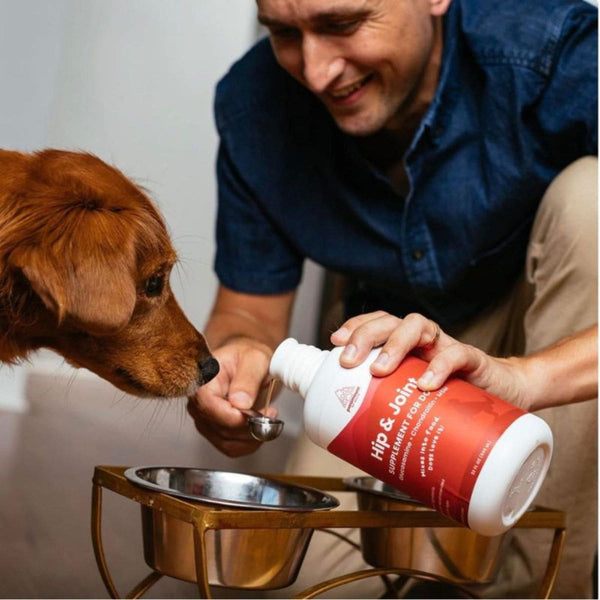
Best Supplements for Arthritis in Senior Dogs
Okay, let's be honest — we aren’t getting any younger, and neither are our dogs! Those creaky, stiff hips and knees aren't just a human problem.
If your once-bouncy best friend is slowing down, it might be time to talk about arthritis. This progressive condition is common in senior pets and can range from mildly painful to debilitating.
Don't worry, though! With a bit of help, we can get that tail wagging again. Let's dive into how supplements can be a great tool (in addition to traditional veterinary treatments) to keep our pups feeling healthy, happy, and young at heart.
- What is Arthritis?
- Spotting the Signs of Arthritis in Your Dog
- Diagnosing Arthritis and Traditional Treatment Approaches
- The Role of Supplements in Arthritis Management for Dogs
- Common Ingredients in Joint Supplements
- Potential Side Effects and Safety Considerations
- Vet-Recommended Joint Supplements for Dogs
What Is Arthritis?
Arthritis, also known as osteoarthritis or degenerative joint disease, is a progressive condition affecting your dog’s joints and mobility.
The ends of your dog's bones, where they meet within a joint, are covered with smooth, rubbery cartilage. This cartilage acts as a shock absorber and facilitates frictionless movement. In a dog with arthritis, this cartilage gradually breaks down.
As the cartilage deteriorates, the bones begin to rub against each other, resulting in pain, inflammation, growth of bony spurs, and formation of scar tissue. Over time, the joint can become swollen and stiff, making even simple tasks like walking or playing uncomfortable.
Arthritis is extremely common in our furry family members. Approximately 25 percent of dogs are diagnosed with arthritis in their lifetime, and as many as 60 percent of dogs have radiographic evidence of it. While arthritis is often linked to aging, certain factors can increase a dog's risk of developing the condition, including:
- Breed: Some breeds are predisposed to joint issues like hip dysplasia, elbow dysplasia, or luxating patellas, increasing their risk of arthritis.
- Size: Larger dogs often put more stress on their joints.
- Obesity: Excess weight adds immense strain to joints, exacerbating arthritis.
- Previous injuries: Injuries to bones or joints (such as a cranial cruciate ligament rupture or other trauma) may weaken them, making arthritis more likely.
- Poor nutrition: If a dog is not eating a WSAVA-compliant complete and balanced diet, they may be lacking key nutrients for bone and joint health. Proper nutrition is also key for growing puppies, especially large breeds.
Spotting the Signs of Arthritis in Your Dog
You may be asking yourself, "Should I give my senior dog joint supplements?". Recognizing the early signs of arthritis is the first step to proper management. Be observant and look for subtle changes, such as:
- Stiffness: Especially noticeable when your dog first gets up after resting, or following intense activity or play.
- Limping or favoring a limb: Your dog may alter their gait to reduce pain.
- Difficulty with stairs or jumping: Actions such as jumping on/off furniture or into a car may become harder.
- Less enthusiasm for walks or playtime: Arthritis pain can diminish energy.
- Irritability or behavioral changes, including reluctance to be touched: Chronic pain affects a dog's mood, and, in some cases, can lead to aggression.
- Licking or chewing at joints: This may be a sign of discomfort, among other things.
You can also use an arthritis checklist to evaluate your dog for potential signs of arthritis, and determine if they would benefit from joint supplements or other veterinary treatment.

Diagnosing Arthritis and Traditional Treatment Approaches
If you notice any of the above signs, schedule a visit with your veterinarian. They'll perform a nose-to-tail physical examination, including watching your dog walk and manipulating their joints to check for pain, swelling, and range of motion.
X-rays may also be recommended to visualize the bones and joints for a definitive arthritis diagnosis.
Once diagnosed, your vet will create a multimodal arthritis management plan tailored to your dog, which may include some or all of the following:
- Weight management: Even a little excess weight puts a huge burden on arthritic joints. Ask your vet how to monitor your dog’s body condition score. If needed, weight loss can be accomplished by decreasing treats/table scraps/amount fed, or with a prescription weight-loss diet.
- Controlled exercise: Low-impact activities like swimming, walking on soft surfaces, and gentle physiotherapy help maintain joint function and reduce stiffness.
- Nonsteroidal anti-inflammatory drugs (NSAIDs): These prescription medications (known by names such as Rimadyl, Metacam, Galliprant, etc.) are a cornerstone for managing arthritis pain and inflammation. Your vet may recommend bloodwork prior to starting, and while taking these medications, to monitor kidney and liver values. Never give your pet over-the-counter or human pain relievers.
- Pain medication: Other types of pain medication, such as tramadol, gabapentin, and amantadine, may be used in addition to NSAIDS.
- Monoclonal antibody therapy: Librela, a new species-specific injection for arthritis in dogs (the cat version is called Solensia), has been making a splash in veterinary medicine recently, showing positive results in managing pain and mobility.
- Joint supplements: Ingredients like glucosamine, chondroitin, omega-3 fatty acids, and others discussed below, can provide added support.
- Prescription diets: Prescription joint/mobility diets are available and contain many of the supplements listed above to help support joint health.
- Physical therapy/rehabilitation: Professional guidance from a therapist helps restore strength, flexibility, and range of motion.
- Alternative therapies: Depending on your dog, options like acupuncture, laser therapy, or hydrotherapy might be beneficial.
- Surgery: In severe cases, surgical procedures may be needed to repair or replace damaged joints.
- At-home modifications: Simple changes at home can make a world of difference to your senior pet, such as providing soft, padded bedding, raising food and water dishes to elbow height, providing a non-skid surface for them to walk on, avoiding high-impact activities, and using ramps or steps to make it easier for your pup to get up onto furniture or into the car.
- Monitoring: Arthritis is a progressive disease. It’s important to check in with your vet and keep them in the loop about how your dog is doing at home. Dogs on medication will also need more frequent exams and bloodwork to make sure they are tolerating the treatments well.

The Role of Supplements in Arthritis Management for Dogs
"Do dog arthritis supplements work?" is a question owners may ask. Alongside traditional therapies, joint supplements play an important role in helping dogs with arthritis. While they won't cure the condition, they can provide significant relief, and some research suggests they may have a protective effect on cartilage, helping to regenerate cartilage, increase joint flexibility, and decrease inflammation.
And more good news — most supplements are generally safe, and can be used to delay progression of arthritis or help manage symptoms. Supplements may also allow your vet to decrease the dosage and frequency of other medications used to manage arthritis pain.
Common Ingredients in Joint Supplements
- Glucosamine: A fundamental component of cartilage, glucosamine potentially aids in cartilage repair, slows breakdown, and reduces inflammation. While studies in this area are few and somewhat lacking, anecdotal evidence suggests positive results in many dogs. More about the glucosamine and if it is safe for dogs here.
- Chondroitin sulfate: Also found naturally in cartilage, chondroitin is often combined with glucosamine, enhancing effectiveness. Research points to its painkilling and mobility-improving benefits.
- Green-lipped mussel (GLM): This unique marine source possesses powerful antiinflammatory omega-3 fatty acids and glycosaminoglycans (GAGs) that actively support joint health and reduce pain.
- Omega-3 fatty acids (Fish Oil): Their potent anti-inflammatory powers make fish oil supplements incredibly valuable for reducing arthritis-related pain and swelling. Additionally, omega-3s support overall health, from heart function to healthy, itch-free skin.
- Avocado and soybean unsaponifiables (ASUs): These compounds are derived from avocados and soybeans. Limited but promising research suggests they may have antiinflammatory properties and support joint health.
- Undenatured type II collagen (UC II): Sourced from chicken cartilage, UC II is a less common supplement ingredient, but studies indicate it might have unique mechanisms in preventing cartilage damage, reducing inflammation, and promoting joint comfort.
- Polysulfated glycosaminoglycan: Adequan® is a prescription injectable medication different from typical oral supplements. It's a disease-modifying osteoarthritis drug, meaning it potentially works to slow cartilage breakdown. Adequan® requires veterinary administration and is often an important component of arthritis treatment plans.
- MSM (Methylsulfonylmethane): This compound may offer pain-relieving and anti-inflammatory effects. It along with glucosamine and chondroitin are important hip and joint supplement ingredients.
- Hyaluronic acid (HA): This key component of natural joint fluid helps lubricate joints, leading to smoother movement and reduced discomfort.
- Curcumin: Turmeric, a common spice, contains curcumin: a natural compound with antiinflammatory properties that might be helpful for arthritis management. However, standard extracts are not well absorbed in dogs, and turmeric itself is not safe for dogs.
- Green tea extract: Green tea extract contains beneficial polyphenols (like epigallocatechin-3-gallate, or EGCG) that have antioxidant and antiinflammatory properties. However, more research is needed to confirm green tea extract’s effectiveness and safety for dogs with arthritis.
- Boswellia serrata: A botanical extract with anti-inflammatory properties.

Potential Side Effects and Safety Considerations
While joint supplements are generally considered very safe for dogs, it's important to be aware of potential side effects. Some of the less commonly used ingredients listed above have not been studied sufficiently to ensure efficacy or safety — and it’s important to always consult with your veterinarian before adding a new supplement to your pet’s diet.
The most common side effects of joint supplements include mild gastrointestinal upset (decreased appetite, vomiting, or diarrhea), lethargy, and changes in thirst or urination. Overdose could occur accidentally (especially with flavored tablets or chews), or by exceeding the recommended dosage over a prolonged period of time. Overdose could lead to severe gastrointestinal distress, increased bleeding risk (especially if your dog is on blood-thinning medication), and potential for liver or kidney damage.
In the event of an overdose, immediately contact your vet or ASPCA Poison Control at (888) 426-4435 (a consultation fee will be required).
Supplements should be used with care, or not at all in some cases. Some supplements might interact with certain medications your dog is taking. For example, glucosamine/chondroitin could potentially increase the risk of bleeding when combined with blood thinners.
Dogs with certain chronic medical conditions, such as diabetes, kidney or liver disease, may need dosage adjustments or may not be suitable for some supplements.
Always consult your veterinarian before adding a new supplement to your dog’s diet. And follow these safety tips for best results:
- Follow your vet’s dosing recommendations: Some products may require a higher loading dose for several weeks before switching to a maintenance dose. Alternatively, your vet may recommend starting at a lower dose and gradually increasing, to avoid stomach upset. Dosing guidelines can generally be found on the supplement packaging, but it’s always best to double check them with your veterinary team.
- Start early: Joint supplements may be better at preventing changes associated with arthritis than reducing symptoms of dogs who are already affected. Talk to your vet about the best time to begin joint supplements for YOUR dog.
- Choose reputable brands: Opt for high-quality supplements from companies with transparent sourcing and quality control practices, including Good Manufacturing Practices (GMP). Supplements are not regulated like medications. Ask your vet if they have a specific recommendation, or look for the National Animal Supplement Council (NASC) seal.
- Monitor your dog closely: Pay attention to any changes in your dog's behavior or health after starting a new supplement. If you notice any significant side effects, stop the supplement immediately and consult your veterinarian.
Vet-Recommended Joint Supplements for Dogs
What is the best arthritis medicine for older dogs? While many joint supplements exist, certain brands stand out due to their proven track record, extensive research, and frequent recommendation by veterinarians. Many of these supplements contain several of the key ingredients listed above, for maximum benefit to your pet. Some of the best joint supplement for senior dogs include:
- Dasuquin: One of the most well-known, featuring a combination of glucosamine, chondroitin sulfate, and ASU.
- Cosequin: Similar active ingredients to Dasuquin, with well-established use in treating arthritis. Is Dasuquin or Cosequin better? They are very similar in all aspects.
- VetriScience Laboratories: Offers a wide range of well-formulated joint supplements under brands like Glycoflex.
- Paramount Pet Health: While less known than some of the biggest brands, they offer high-quality glucosamine and omega-3 supplements, among other products. They are also dedicated to providing up to date and research-backed education to pet owners — including the blog you’re currently reading!
- Nordic Naturals: A reputable brand known for high-quality, purified fish oil supplements.
- Joint-supporting diets such as Hill's® Prescription Diet® J/D®, Royal Canin Advanced Mobility®, and Purina Pro Plan Veterinary JM Joint Mobility®
- Others: Your veterinarian might have specific recommendations based on your dog's needs.

A Note on Arthritis in Cats
It's important to remember that our feline friends aren't immune to arthritis either. Arthritis is incredibly common in senior cats (in fact, even more so than in dogs).
Unfortunately, cats are masters at hiding pain and discomfort and their subtle signs of arthritis are easily missed. If you notice anything unusual in your cat's behavior or mobility, don't hesitate to schedule a visit with your veterinarian.
Arthritis and Supplements for Senior Dogs - Wrap up
Though arthritis can't be cured, supplements are a great way to help prevent progression and manage symptoms, especially when used in conjunction with more traditional treatments provided by your veterinarian.
Even with supplements, many dogs will experience a gradual decline as arthritis progresses. However, they offer a way to make those golden years a little brighter with less discomfort. By choosing the right supplements, prioritizing quality, and consulting with your vet, you can promote joint health, reduce pain, and improve your senior dog's mobility and quality of life.
The world of joint supplements can be overwhelming. If you're asking yourself what supplements does a senior dog need or unsure where to start, don't hesitate to talk to your veterinarian. They are your best resource for personalized recommendations and ensuring your dog gets the most out of any supplement plan.


Leave a comment